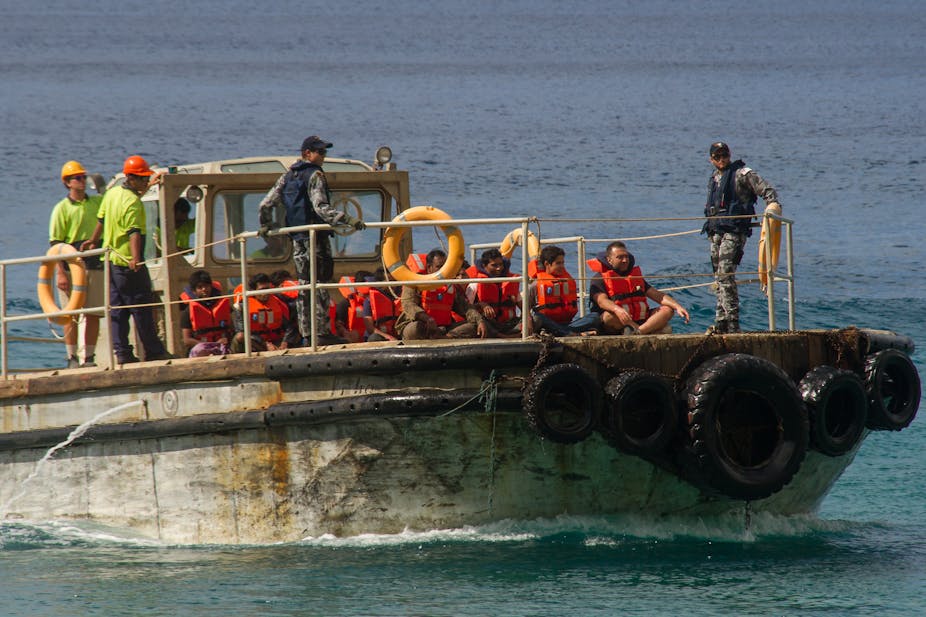Before 9/11 and the “Tampa” episode in 2001, Australia played a thoroughly constructive and decent role in refugee resettlement following World War Two and the Vietnam War.
This happened despite a cultural fear of invasion by people who are “not like us”, which has been with us for the past 200 years. In the past two decades, however, that fear has prevailed.
In 1992, the Labor government introduced mandatory detention for unauthorised arrivals. In 2001, the flow of boats with people fleeing Middle Eastern countries prompted a strong election campaign stance by then prime minister John Howard.
Howard won back waning electoral support for his statement:
We will decide who comes to this country and and the circumstances in which they come.
The return of the Howard government cemented in place a bipartisan policy that treated asylum seekers as queue jumpers, illegal immigrants and potential terrorists.
Adverse reports by the United Nations High Commissioner for Refugees and complaints by refugee advocacy groups and Amnesty International have fallen on deaf ears. The major parties have embraced a “shock and awe” approach to try to deter refugees and asylum seekers from making the hazardous trip to Australia with the help of people smugglers.
For now, people coming by boat and seeking asylum have been warned they will never live in Australia. They will be sent to Nauru or Manus Island for assessment and possible resettlement or return to their home countries.
Tony Abbott’s mantra of “Stop the boats” was central to his victorious election campaign in September 2013. On assuming office, Abbott and his immigration minister, Scott Morrison, adopted the Rudd PNG plan and launched a military-style operation known as Sovereign Borders.
But many Australians are appalled and ashamed at Australia’s stance in the face of massively growing flows of refugees from centres of conflict and oppression. Former governor-general Sir William Deane launched for Australia21 this week a book of 24 essays, Refugees and asylum seekers: finding a better way.
The essay authors include refugees, legal experts, ethicists, clinicians, former administrators of Australian migration and refugee policy, former chiefs of the Defence Force and the Australian Federal Police, a former leader of the Liberal Party, a former Secretary of Defence, the producer of the SBS program Go Back to Where You Came From, refugee advocates, church people and the chair of the Australian Human Rights Commission.
Essayists were asked to suggest practical ways in which the Australian community might respond more humanely, more sustainably and more responsibly to the desperate people who aspire to settle in our lucky country.
What emerges clearly from these essays is that what Australia is doing is harmful, expensive and unsustainable in the face of what is happening globally.
On the surface, it might seem that Australians accept the negative image of asylum seekers. The political discussion has been very narrowly focused on boats and people smugglers. A systematic dehumanisation of the asylum seekers and the 24-hour media cycle have fed the notion that Australia is facing a crisis, a veritable invasion by aliens.

Nobody suggests that there is a silver bullet solution. The authors agree, though, that there are much better ways to deal with this complex issue. They argue that we must begin with a new national conversation.
Our uniquely privileged Australian population needs to gain a better understanding of what is happening to many millions of our fellow, less fortunate global residents.
Former Liberal leader John Hewson puts it most baldly:
We have wasted billions of dollars in the futile and irresponsible attempt to score short-term political points without creating a sustainable long-term solution … The management of the asylum seeker issue in recent years has been nothing short of a national disgrace.
Our hard-earned international reputation, built up over decades for punching above our weight in terms of the humanitarian treatment and resettlement of refugees, has been squandered on what has been a most unedifying race to the bottom between the two major political parties, each attempting to demonstrate at every opportunity over the increasingly frenetic daily media cycle how tough and discouraging they can be with people who are mostly fleeing persecution or even death in their home country.
Australia is not alone in needing to face up to the complexities of refugee flows. We cannot simply close our eyes and our borders to what is happening in the world around us. We must return to the role of responsible global citizenship.
The consensus among the authors of this volume is that it will not be easy, but we can do much better.

